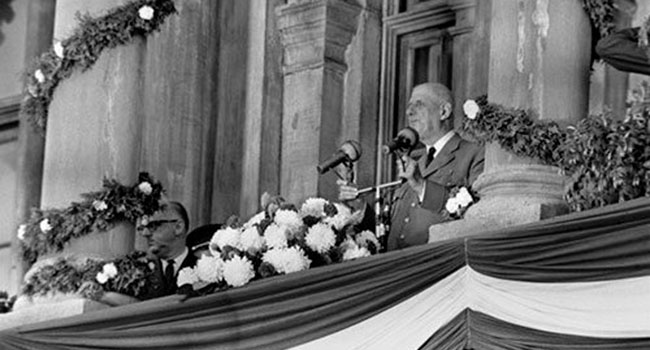 I remember the reaction to French president Charles de Gaulle’s intrusion into Canadian affairs during the centennial summer of 50 years ago. Astonishment and outrage are perhaps the two best descriptors of public sentiment, at least as far as English-speaking Canada was concerned.
I remember the reaction to French president Charles de Gaulle’s intrusion into Canadian affairs during the centennial summer of 50 years ago. Astonishment and outrage are perhaps the two best descriptors of public sentiment, at least as far as English-speaking Canada was concerned.
Being a new Canadian of less than two years standing, I didn’t have the visceral response that other people in the office did. But to say that they were unimpressed would be an understatement. The elderly man who was supplementing his pension by delivering mail between floors was particularly disgusted.
De Gaulle arrived in Quebec City by sea on July 23, 1967, and proceded to make his way to Montreal. Along the route, his motorcade was greeted by enthusiastic crowds. Recounting the scene, the writer and Liberal stalwart Thomas Axworthy describes de Gaulle as noticing placards with the separatist slogan “Vive le Quebec libre.”
The bombshell came on the evening of July 24, via an apparently unscheduled address from the balcony of Montreal’s city hall.
Explicitly likening the atmospherics to the Second World War liberation of Paris, de Gaulle swung for the bleachers: “Vive Montreal! Vive le Quebec! Vive le Quebec libre! Vive le Canada Francais, et vive la France!” Yes, the visiting French president had just publicly called for the dismemberment of his host country.
Official Canadian reaction was swift.
At a federal cabinet meeting the following day, Paul Martin Sr. of External Affairs was cautious, observing that de Gaulle had a lot of support in Quebec and that taking him on would serve no purpose. In contrast, Pierre Trudeau, the new Minister of Justice, argued for a strong reaction. Minister of Trade and Commerce Robert Winters was similarly hard-line.
Later that day, Prime Minister Lester Pearson’s public statement didn’t go as far as some would have liked. But he did call de Gaulle’s speech “unacceptable.” And he added this: “Canadians do not need to be liberated. Indeed, many thousands of Canadians gave their lives in two world wars in the liberation of France and other European countries.”
Although not formally expelled, de Gaulle’s visit was clearly running out of road. So he cut it short and flew home.
What, then, was de Gaulle’s motivation? And were his remarks premeditated?
French historian Jacques Portes is of the view that there was nothing accidental in what transpired. He quotes an earlier declaration of de Gaulle’s intent: “In 1967, we will not go celebrate the hundredth anniversary of the Canadian Confederation in Montreal, as English Canadians and the federal government would like us to. If we go, it will be to celebrate two hundred years of French Canadian loyalty to France.”
Another historian, the late Dale Thomson, cited a conversation between de Gaulle and his son-in-law in which de Gaulle spoke of the need to “strike a strong blow” in order to “rectify the cowardice of France.” In effect, he was going to compensate for France abandoning Quebec to the British in 1763.
Portes sees de Gaulle’s position as having evolved over the years, beginning with his first visit as 1944 wartime leader of the Free French. By 1963, he was of the view that “French Canada is destined to become a [sovereign] state and we must act with this perspective in mind.”
It’s also useful to appreciate the extent to which de Gaulle was driven by two complementary desires. One was to restore the grandeur of France and what he perceived as its rightful place in the world. And the other was to stick it to the “Anglo-Saxons” whenever the opportunity presented itself.
Along these lines, he had developed France’s independent nuclear strike force, withdrawn from active NATO participation, and vetoed Britain’s entry into the European Common Market (forerunner of the European Union). France would pursue its historic destiny, act independently and do whatever was necessary to promote its interests.
The Canadian diplomat Georges Vanier and his wife Pauline may have befriended de Gaulle when he fled to London in 1940, and Canada may have hosted him on several visits. But that didn’t generate any reciprocal respect for Canada’s national integrity.
Canadian elites, though, were sufficiently positive about their country to call de Gaulle up on it in 1967. Given the current intellectual fashion for guilt-mongering over our “colonial” past, one wonders whether the same would happen today.
Troy Media columnist Pat Murphy casts a history buff’s eye at the goings-on in our world. Never cynical – well perhaps a little bit.
The views, opinions and positions expressed by columnists and contributors are the author’s alone. They do not inherently or expressly reflect the views, opinions and/or positions of our publication.
